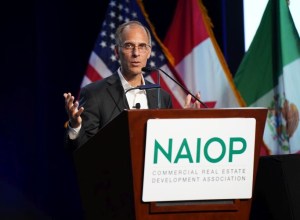Takeaways From NAIOP’s CRE.Converge
Industry leaders shared insights into the economy, the talent pool and other critical issues.

Mark Zandi, Chief Economist of Moody’s Analytics and Co-founder of Moody’s Economy.com. Image courtesy of NAIOP
Views on the economy, commercial real estate and the industry’s shrinking talent pool were among the topics discussed at NAIOP’s second in-person conference since the pandemic began.
The commercial real estate association’s CRE.Converge took place this week in Miami Beach, Fla., with more than 1,000 attendees. The organization’s industrial real estate-focused I.CON conference was held last month in Long Beach, Calif., with a second I.CON planned for November in Jersey City, N.J.
READ ALSO: Keynotes at NAIOP’s I.CON West Focus on Economics, Leadership
CRE.Converge convenes all sectors of the commercial real estate and the outlook was bright. Here are some key takeaways:
- Two economists—Mark Zandi, chief economist, Moody’s Analytics, and co-founder, Moody’s Economy.com and Hessam Nadji, president & CEO of Marcus & Millichap—presented positive views on the economy as it relates to commercial real estate.
Nadji said that the second quarter of 2021 set a record quarter for real estate transaction volume. “There is an unbelievable amount of trading that is going on today; it is a great environment on the trading side of the equation.”
He said that over the last six months, the property types that have improved most sharply are warehouse, suburban multifamily, student housing and hospitality. Those that are declining are suburban office, urban office and lower-tier shopping centers.
He added that he has never seen as much demand for low-risk, low-reward cash flow investments.
Zandi said that a key driving factor is the pandemic-driven increase in productivity, which will have a spillover effect onto all sectors of commercial real estate.
- The shrinking talent pool will be increasingly impactful to the industry.
“I know we’re all dealing with labor shortages,” said Celeste Tanner, chief development officer at Confluent Development, based in Denver.
“Some of our best development, property management and capital markets people did not come out of a real estate program or a real estate background,” said Molly Carson, LEED AP, senior vice president of real estate development, market leader, at Ryan Cos. US Inc. in Phoenix.
People from other industries bring new perspectives to the table—which is critical in real estate. “Real estate is for everyone, so you need [perspectives from] every different type of occupier,” Tanner said.
That’s not to say there isn’t a well of underutilized talent already within the industry. Stephanie Rodriguez, regional senior vice president – Florida for Duke Realty, said Duke has had success giving employees opportunities in new disciplines. She urged companies not to ignore talent already in the organization who may be in a completely different role.
- Life Sciences May Come Out of the Industrial Shadow
As part of the commercial real estate industry, the life science market is dwarfed by its industrial sibling. Where the latter comprises 14 billion square feet of developed space nationwide, the life science sector includes 150 million square feet.

A keynote address was given by basketball star and real estate entrepreneur Grant Hill, co-owner of the Atlanta Hawks. Image courtesy of NAIOP
It may be a niche segment, but it’s drawing outsized interest from private investors and federal health and science agencies, economic development professionals, and even state and local leaders eager to bring the sector to their markets, noted panelists exploring the role of life sciences in the real estate sector.
“We have more capital and more landlord and investor groups chasing this asset class than we ever have before,” said panel moderator Lauren Gilchrist, managing director for research with Longfellow Real Estate Partners in Philadelphia.
- A keynote address was given by basketball star and real estate entrepreneur Grant Hill.
Hill, co-owner of the Atlanta Hawks, is also an investor in a multibillion-dollar investment in the city’s downtown with residential, retail and lifestyle amenities.
The project is not without risk. But Hill, who was mentored by another athlete turned corporate real estate mogul, Roger Staubach, said that he lives by an adage that his mother gave him: “More people are ruined by success than by failure.”








You must be logged in to post a comment.